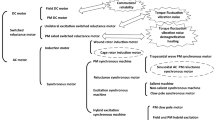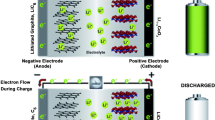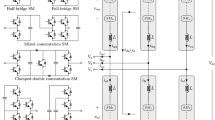Abstract
In dual-motor drive systems, a supercapacitor is connected to a common direct current (DC) bus through a DC/DC converter for the storage and utilization of regenerative energy, which is an effective energy saving method. However, the uncoordinated control of this type of system results in undesirable power circulation and reduced energy utilization efficiency. In this paper, an optimal power tracking control strategy based on a power flow predictive model is proposed. The power flow of the system is analyzed and a power flow predictive model is established. In addition, an objective function is deduced from the perspective of optimal performance tracking and minimum grid side energy consumption. The reference power of a supercapacitor is obtained in real time under constraints. The power flows among the grid side, the motors, and the energy storage unit are fully coordinated to realize a reasonable energy distribution. Experimental results indicate that the energy utilization efficiency of the system is improved by 25.4% in comparison with double closed-loop control in one working period.










Similar content being viewed by others
References
Lin, Q.F., Niu, S.X., Cai, F.B., Fu, W.N., Shang, L.K.: Design and optimization of a novel dual-PM machine for electric vehicle applications. IEEE Trans. Veh. Technol. 69(12), 14391–14400 (2020)
Herrera, V.I., Gaztanaga, H., Milo, A., Saez-de-Ibarra, A., Etxeberria-Otadui, I., Nieva, T.: Optimal energy management and sizing of a battery-supercapacitor-based light rail vehicle with a multiobjective approach. IEEE Trans. Ind. Appl. 52(4), 3367–3377 (2016)
Yang, X.F., Zhang, L.W., Xie, W., Zhang, J.F.: Sequential and iterative distributed model predictive control of multi-motor driving cutterhead system for TBM. IEEE Access. 7, 46977–46989 (2019)
Hu, X.S., Li, Y.P., Lv, C., Liu, Y.G.: Optimal energy management and sizing of a dual motor-driven electric powertrain. IEEE Trans. Power Electron. 34(8), 7489–7501 (2019)
Jones, M., Vukosavic, S.N., Dujic, D., Levi, E., Wright, P.: Five-leg inverter PWM technique for reduced switch count two-motor constant power applications. IET Electr. Power App. 2(5), 275–287 (2008)
Wu, Y.J., Cheng, Y.B., Wang, Y.L.: Research on a multi-motor coordinated control strategy based on fuzzy ring network control. IEEE Access. 8, 39375–39388 (2020)
Pal, S., Majumder, M.G., Rakesh, R., Gopakumar, K., Umanand, L., Zielinski, D., Beig, A.R.: A cascaded nine-level inverter topology with T-type and H-bridge with increased DC-bus utilization. IEEE Trans. Power Electron. 36(1), 285–294 (2021)
Hu, W., Ruan, C.H., Nian, H., Sun, D.: Simplified modulation scheme for open-end winding PMSM system with common DC bus under open-phase fault based on circulating current suppression. IEEE Trans. Power Electron. 35(1), 10–14 (2020)
Hu, W., Nian, H., Zheng, T.Y.: Torque ripple suppression method with reduced switching frequency for open-winding PMSM drives with common DC bus. IEEE Trans. Ind. Electron. 66(1), 674–684 (2019)
Zhang, X.G., Wang, K.Q.: Current prediction based zero sequence current suppression strategy for the semicontrolled open-winding PMSM generation system with a common DC bus. IEEE Trans. Ind. Electron. 65(8), 6066–6076 (2018)
Li, J.F., Tang, T.H., T.Z. Wang, Yao, G.: Modeling and simulation for common DC bus multi-motor drive systems based on activity cycle diagrams. In: IEEE International Symposium on Industrial Electronics (ISIE 2010), Bari, Italy, 4–7 July 2010
Zhu, F.Q., Yang, Z.P., Lin, F., Xin, Y.: Decentralized cooperative control of multiple energy storage systems in urban railway based on multiagent deep reinforcement learning. IEEE Trans. Power Electron. 35(9), 9368–9379 (2020)
Khodaparastan, M., Mohamed, A.A., Brandauer, W.: Recuperation of regenerative braking energy in electric rail transit systems. IEEE Trans. Intell. Transp. 20(8), 2831–2847 (2019)
Chen, J.Y., Hu, H.T., Ge, Y.B., Wang, K., Huang, W.L., He, Z.Y.: An energy storage system for recycling regenerative braking energy in high-speed railway. IEEE Trans. Power deliver. 36(1), 320–330 (2021)
Bi, K., Sun, L., An, Q., Duan, J.: Active SOC balancing control strategy for modular multilevel super capacitor energy storage system. IEEE Trans. Power Electron. 34(5), 2129–2140 (2019)
Tummuru, N.R., Mishra, M.K., Srinivas, S.: Dynamic energy management of hybrid energy storage system with high-gain PV converter. IEEE Trans. Energy Conver. 30(1), 150–160 (2015)
Kreczanik, P., Venet, P., Hijazi, A., Clerc, G.: Study of supercapacitor aging and lifetime estimation according to voltage, temperature, and RMS current. IEEE Trans. Ind. Electron. 61(9), 4895–4902 (2014)
Zhang, H.J., Zhang, F., Yang, L., Gao, Y., Jin, B.Q.: Multi-parameter collaborative power prediction to improve the efficiency of supercapacitor-based regenerative braking system. IEEE Trans. Energy Convers. 36(4), 2612–2622 (2021)
Iannuzzi, D., Pagano, E., Tricoli, P.: The use of energy storage systems for supporting the voltage needs of urban and suburban railway contact lines. Energies 6(4), 1802–1820 (2013)
Zhang, J.J., Yang, Y., Qin, D.T., Fu, C.Y., Cong, Z.P.: Regenerative braking control method based on predictive optimization for four-wheel drive pure electric vehicle. IEEE Access. 9, 1394–1406 (2021)
Liu, H.W., Lei, Y.L., Fu, Y., Li, X.Z.: An optimal slip ratio-based revised regenerative braking control strategy of range-extended electric vehicle. Energies 13(6), 1526 (2020)
Xu, Q.W., Zhou, C., Huang, H., Zhang, X.F.: Research on the coordinated control of regenerative braking system and ABS in hybrid electric vehicle based on composite structure motor. Electronics 10(3), 223 (2021)
Yang, Z.H., Yang, Z.P., Xia, H., Lin, F.: Brake voltage following control of supercapacitor-based energy storage systems in metro considering train operation state. IEEE Trans. Ind. Electron. 65(8), 6751–6761 (2018)
Zhong, Z.H., Yang, Z.P., Fang, X.C., Lin, F., Tian, Z.B.: Hierarchical optimization of an on-board supercapacitor energy storage system considering train electric braking characteristics and system loss. IEEE Trans. Veh. Technol. 69(3), 2576–2587 (2020)
Heydari, S., Fajri, P., Rasheduzzaman, M., Sabzehgar, R.: Maximizing regenerative braking energy recovery of electric vehicles through dynamic low-speed cutoff point detection. IEEE Trans. Transp. Electr. 5(1), 262–270 (2019)
Wang, C.Y., Zhao, W.Z., Li, W.K., Yu, L.Y.: Multi-objective optimisation of electro-hydraulic braking system based on MOEA/D algorithm. IET Intell. Transp. Sy. 13(1), 183–193 (2019)
Acknowledgements
The authors would like to thank the National Natural Science Foundation of China (No. 51775363) and the Key Research and Development Projects of Shanxi Province (No. 201803D121124) for funding this research project.
Author information
Authors and Affiliations
Corresponding author
Ethics declarations
Conflict of interest
On behalf of all authors, the corresponding author states that there is no conflict of interest.
Rights and permissions
About this article
Cite this article
Sun, S., Zhang, H., Wang, X. et al. Power flow predictive model control to improve the efficiency of regenerative energy storage and utilization. J. Power Electron. 22, 1758–1768 (2022). https://doi.org/10.1007/s43236-022-00472-4
Received:
Revised:
Accepted:
Published:
Issue Date:
DOI: https://doi.org/10.1007/s43236-022-00472-4




